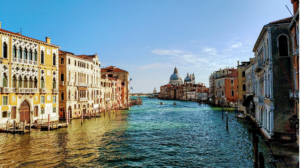In a decision that has caused upset but also anger among Italian officials, UNESCO this week recommended to place Venice and its lagoon onto the list of World Heritage sites in danger. The final call will be made at the body’s convention in Riyadh, Saudi Arabia, in September.
According to The New York Times, the country’s former minister of public administration for the Draghi government, who now leads sustainability efforts in Venice, said that the UNESCO’s decision didn’t reflect all the work that had been done to protect the city from the impacts of climate change and mass tourism. However, the World Heritage Convention in a document released Monday points out that Venice’s seawall against rising water levels and floods had not been finalized, that the ban on large cruise ships was not yet fully enforced and that some sites proposed for new cruise terminals might also be questionable from a conservation standpoint. The city was also urged to find models to reduce its exceptionally high number of visitors, something that could be achieved with a new system of ticketing and entry fees to the city – the introduction of which has repeatedly been delayed, however.
A look at the current list of cultural World Heritage sites in danger shows that many are located in war zones and unstable states, like Syria, Lebanon, Palestine, Afghanistan, Iraq, Yemen, Venezuela, Libya, Mali and Ukraine. Others have been put on there after a fire, namely the Tasubi Tombs in Uganda, or are threatened by construction projects, like historic sites in Egypt and Uzbekistan as well as the Vienna historic center, where UNESCO is taking issue with the construction of a large new hotel. Increased development in the city was also the reason why Liverpool in the UK lost its World Heritage status in 2021.
While climate change has been a factor in the endangerment of natural World Heritage sites, Venice would be the only cultural heritage entry on the list where climate change is having a significant impact. Besides the historic centers of Ukrainian cities Lviv and Kiev, the natural World Heritage monument Volcanos of Kamchatka in Russia is being recommended for the endangered list. Grave warnings were meanwhile extended to the historic cities of Budapest, Hungary, and Zanzibar, Tanzania, as well as the Australian Great Barrier Reef, among others. A report on several more watchlist sites, including the UK’s Stonehenge, is still outstanding.
You will find more infographics at Statista
Ask me anything
Explore related questions






